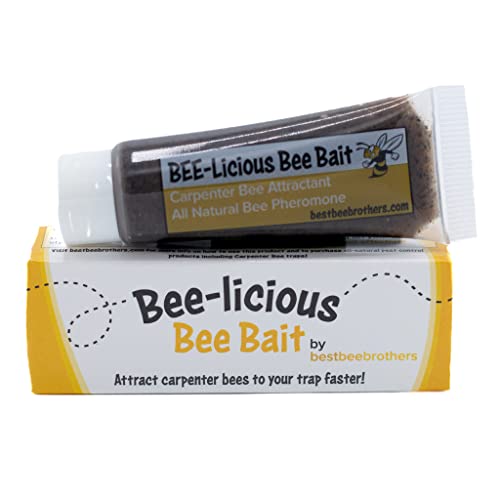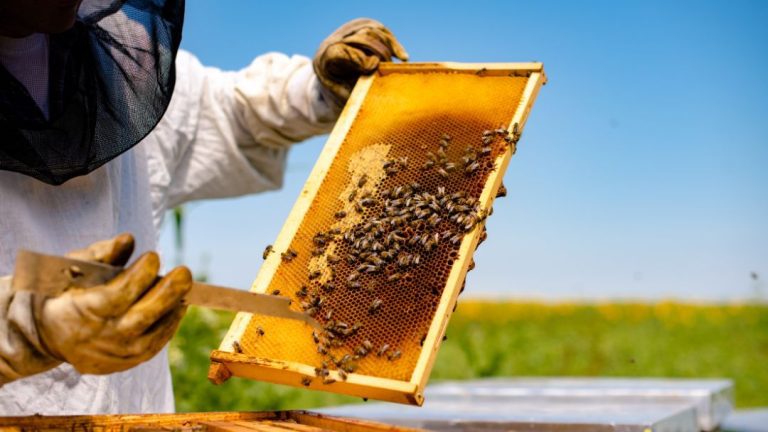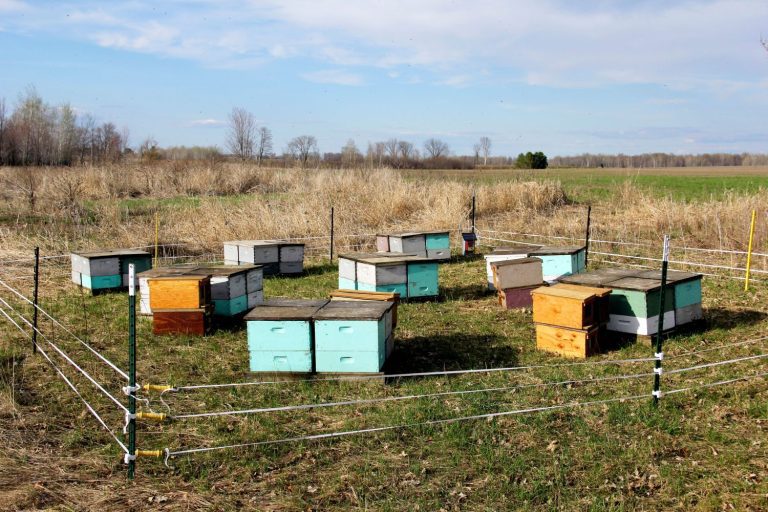Perspective on Feeding Bees: Essential Tips for Beekeepers
Feeding bees is important to support their health and well-being. We will explore the perspective on feeding bees and why it is crucial for their survival.
Bees play a vital role in pollination, which contributes to the growth of plants and the production of various crops. However, factors like habitat loss, pesticides, and climate change have led to a decline in bee populations worldwide. To ensure their survival, beekeepers and enthusiasts feed bees with supplemental nutrition, such as sugar syrup and pollen substitutes.
This helps to provide them with essential nutrients and support their immune systems. Additionally, feeding bees can help colonies survive harsh weather conditions and periods of food scarcity. Let’s delve into the importance of feeding bees and the various perspectives surrounding this practice.
Importance Of Proper Bee Feeding
Proper bee feeding is essential for the health and well-being of honey bee colonies. As a beekeeper, it becomes your responsibility to provide your bees with the right nutrition at the right time. The role of bee feeding goes beyond just keeping the bees well-fed; it directly influences colony development, hive health, and overall honey production. Understanding the nutritional needs of bees and the effect of feeding on colony development can help you make informed decisions about their welfare.The Role Of Bee Feeding In Hive Health
Feeding bees plays a crucial role in maintaining hive health. Bees require a diverse range of nutrients to thrive. In certain situations, such as during periods of food scarcity, extreme weather conditions, or when colonies are weakened by diseases or pest infestations, providing supplemental feeds becomes necessary. This ensures that the bees have a continuous supply of essential nutrients, preventing malnutrition and increasing their chances of survival.Understanding The Nutritional Needs Of Bees
To effectively feed bees, it is crucial to understand their nutritional requirements. Bees primarily require carbohydrates in the form of sugars, which they convert into energy for various hive activities. However, they also need proteins, lipids, vitamins, and minerals for proper growth, development, and immune function. Pollen, collected by worker bees, serves as the primary source of proteins and other essential nutrients. Nectar, on the other hand, provides the carbohydrates needed for energy. Understanding this balance of nutrients helps in formulating appropriate bee feeds that meet their specific requirements.Effect Of Feeding On Colony Development
Feeding bees properly can have a significant impact on colony development. Adequate nutrition during key stages, such as brood rearing and winter preparations, enhances egg production, larval development, and overall colony strength. Insufficient or imbalanced feeding, on the other hand, can lead to decreased brood viability, weakened immune systems, and impaired colony growth. As a beekeeper, paying close attention to the feeding needs of your bees and ensuring a consistent supply of appropriate feeds can promote healthy colony growth, increased honey production, and overall hive success.To sum up, the importance of proper bee feeding cannot be overstated. Being aware of the role of bee feeding in hive health, understanding the nutritional needs of bees, and recognizing the effect of feeding on colony development are essential aspects of responsible beekeeping. By providing your bees with the right nutrients at the right times, you contribute to the well-being and productivity of your honey bee colonies.Choosing The Right Feed For Bees
Feeding bees can be a crucial aspect of beekeeping, especially during times when natural food sources are scarce. Providing suitable supplements and ensuring their access to essential nutrients is essential for maintaining strong, healthy colonies. However, with a range of options available, choosing the right feed for bees can be a daunting task. In this section, we will explore the different types of feed for bees, the pros and cons of each, and the factors to consider when selecting a bee feed.
Types Of Feed For Bees: Sugar Solutions, Pollen Substitutes, And Supplements
When it comes to meeting the nutritional needs of your bees, there are three main types of feed to consider: sugar solutions, pollen substitutes, and supplements.
Sugar solutions are an accessible and cost-effective way to feed bees. They can be made by dissolving granulated sugar in water to mimic the nectar that bees collect from flowers. This type of feed provides a source of carbohydrates for energy and can be supplemented with essential oils or additives to enhance the bees’ health.
Pollen substitutes, on the other hand, aim to mimic the protein-rich pollen that bees collect for brood rearing. They are typically made from a combination of soy flour, brewer’s yeast, and other ingredients. While pollen substitutes can be a valuable resource to ensure the colony’s protein requirements are met, they should ideally be used as a supplement rather than a sole food source.
Supplements, such as vitamins or minerals, can also play a role in supporting the overall well-being of your bee colonies. They are commonly used to address specific nutritional deficiencies or to boost the immune system of the bees during periods of stress.
Pros And Cons Of Different Bee Feeds
Each type of bee feed has its own advantages and disadvantages. Here, we outline the pros and cons of different bee feeds:
| Feed Type | Pros | Cons |
|---|---|---|
| Sugar Solutions | – Cost-effective and easily accessible – Provides a source of carbohydrates – Can be supplemented with additives for additional benefits | – Lacks essential proteins and other nutrients found in pollen – Should not be used as a sole food source |
| Pollen Substitutes | – Provides a source of protein for brood rearing – Can be used when natural pollen sources are scarce – Can be formulated to meet specific nutritional needs | – Does not replicate the full nutritional complexity of natural pollen – Should be used as a supplement rather than a sole food source |
| Supplements | – Can address specific nutritional deficiencies – Can boost the immune system of bees – Can support overall colony health during periods of stress | – Should be used selectively rather than as a routine feed – Over-supplementation can have negative effects |
Factors To Consider When Selecting A Bee Feed
When choosing the right feed for your bees, it’s important to consider a few key factors:
- The nutritional needs of your bees: Bees have specific requirements for carbohydrates, proteins, and other essential nutrients. Select a feed that can adequately fulfill these nutritional needs.
- The purpose of the feed: Determine if the feed will be used as a supplement or as the primary food source. This will help you select the appropriate type and formulation.
- The availability and cost of ingredients: Consider the availability and cost of the feed ingredients, as well as any potential environmental or ethical concerns associated with them.
- The season and local flora: Take into account the natural availability of food sources during different seasons. Adjust the feed accordingly to supplement any shortages.
- Your specific goals and preferences: Consider your specific goals as a beekeeper, such as boosting colony strength, increasing honey production, or supporting overall bee health. These objectives can influence your choice of feed.
By considering these factors and understanding the different types of feed available, you can make an informed decision when selecting the right feed for your bees. Remember, providing a balanced and suitable diet for your bees is crucial in ensuring their well-being and the success of your beekeeping endeavors.
Feeding Techniques For Beekeepers
In the world of beekeeping, feeding techniques play a crucial role in ensuring the health and well-being of the bee colonies. Proper feeding practices help beekeepers in managing hive populations, stimulating brood production, and supplementing nectar during lean periods. In this section, we will explore various feeding techniques for beekeepers, including the advantages and disadvantages of open feeding vs indoor feeding, different types of feeders such as top feeders, Boardman feeders, and division board feeders, as well as effective feeding practices to minimize bee stress.
Open Feeding Vs Indoor Feeding: Advantages And Disadvantages
When it comes to feeding bees, beekeepers have the option to choose between open feeding and indoor feeding. Both methods have their own advantages and disadvantages.
Feeder Types: Top Feeders, Boardman Feeders, And Division Board Feeders
| Feeder Type | Advantages | Disadvantages |
|---|---|---|
| Top Feeders |
|
|
| Boardman Feeders |
|
|
| Division Board Feeders |
|
|
Effective Feeding Practices To Minimize Bee Stress
When feeding bees, it is essential to minimize stress on the colony. Here are some effective practices to ensure a stress-free feeding process:
- Choose the appropriate feeder type based on your beekeeping goals and hive setup.
- Provide feed early in the morning or late in the evening to avoid attracting other insects.
- Use syrup with the correct sugar-to-water ratio (typically 1:1 or 2:1) to provide the necessary nutrients for the bees.
- Monitor and manage the feed levels regularly to prevent overflow or depletion.
- Keep feeders clean to avoid the spread of diseases and minimize contamination.
- Ensure adequate ventilation in the hive to prevent excess moisture buildup from the feeding process.
- Observe the behavior of bees around the feeder to identify any signs of aggression or robbing.
- Monitor overall hive health and be prepared to adjust feeding practices based on colony requirements.
Timing And Frequency Of Bee Feeding
Seasonal Considerations: Spring Feeding
When it comes to feeding bees, timing and frequency play a crucial role in ensuring the health and productivity of these incredible pollinators. The seasonal variations throughout the year demand different approaches to bee feeding. Let’s explore the specific considerations for each season:
Spring
In the spring, bees need a boost of energy to kickstart their colony’s growth and reproductive activities. During this time, it’s essential to provide bees with adequate nutrition so that they can develop the necessary strength and resources to thrive.
Summer Feeding
Summer
Summer is a period when bees are most active in foraging for nectar and pollen. It is usually a time of abundance for them, as the blooming flowers offer a natural food source. However, during periods of drought or low floral resources, supplementary feeding might be necessary to sustain the colony’s population and ensure their continued well-being.
Fall Feeding
Fall
In the fall, as the days grow shorter and temperatures start to decline, beekeepers need to prepare their colonies for winter survival. Bees require ample food reserves to sustain them during the colder months when natural food sources dwindle or disappear entirely. Fall feeding helps ensure their vitality and enables them to endure the approaching winter.
Winter Feeding
Winter
Winter is the most challenging season for bees, as they experience reduced activity and confinement to their hives. During this period, bees form a winter cluster to keep warm and rely on their stored food reserves. If their winter stores are insufficient, beekeepers must intervene by providing supplemental feed to prevent starvation and colony losses.
Assessing Food Stores: When And How To Feed Bees
Assessing the food stores within a beehive is a crucial step in determining when and how to feed bees. By regularly monitoring their food consumption, beekeepers can gauge the availability and quality of their forage sources. This assessment can help decide whether supplemental feeding is necessary and the appropriate timing for intervention.
One simple method to assess food stores is to observe the frames within the hive’s brood and honey supers. By carefully inspecting the frames, you can estimate the amount of capped honey and uncapped nectar present. A healthy quantity of stored honey indicates a stable food supply, while a lack of reserves may require immediate action.
Importance Of Monitoring Bee Consumption
Monitoring bee consumption is vital to ensure that bees are receiving the necessary nutrition for their survival and well-being. By regularly tracking their food intake, beekeepers can detect any changes or abnormalities that may indicate an issue within the hive.
Tracking bee consumption involves observing the weight of the hive. By using a hive scale or performing regular manual measurements, beekeepers can note any significant fluctuations in weight over time. A sudden decrease in weight might signal a scarce food supply or the presence of other problems, prompting the need for intervention and feeding.
Tips For Successful Bee Feeding
When it comes to beekeeping, providing proper nutrition is crucial for the health and productivity of your bees. Bee feeding is an effective way to supplement their natural food sources, especially during times when nectar and pollen may be scarce. To ensure successful bee feeding, it is important to maintain optimal hive conditions, practice good hygiene when using feeders and feed solutions, and take steps to prevent robbing and ensure proper nutrition for your bees.
Maintaining Hive Conditions For Optimal Bee Feeding
Creating favorable hive conditions is essential for successful bee feeding. A strong and healthy hive provides a solid foundation for bees to thrive. Here are some key points to consider:
- Regularly inspect your hive: Monitoring the health and condition of your hive will help you identify any issues or potential problems that could affect bee feeding.
- Ensure adequate space: Bees need enough room to store their food, particularly when you are feeding them. Make sure the hive has sufficient comb space to accommodate the additional food.
- Keep the hive well-ventilated: Proper ventilation helps regulate temperature and humidity, preventing moisture buildup that could lead to mold and disease.
- Minimize disturbances: Limiting disturbances such as unnecessary hive manipulations and frequent inspections can help reduce stress for the bees and promote their overall well-being.
Hygiene Practices For Feeders And Feed Solutions
Good hygiene is vital when it comes to bee feeding. Maintaining cleanliness helps prevent the spread of diseases and ensures the integrity of the feed. Consider the following practices:
- Clean and sterilize equipment: Before using any feeding equipment, make sure it is thoroughly cleaned and sanitized to eliminate any potential pathogens or contaminants.
- Use clean feed solutions: Prepare your feed solutions using high-quality ingredients and ensure that they are free from any impurities or spoiled substances that could harm the bees.
- Monitor feeding equipment: Regularly check your feeders for any signs of mold, mildew, or other contamination. Replace or clean them as necessary to maintain a hygienic feeding environment.
- Keep feeders protected: Place feeders in sheltered locations to prevent contamination from rainwater, dust, or other environmental factors.
Tips To Prevent Robbing And Ensure Proper Nutrition For Bees
Robbing, which occurs when bees from neighboring hives steal food from weaker colonies, can be detrimental to the overall health and productivity of your bees. To prevent robbing and ensure proper nutrition, follow these recommendations:
- Implement entrance reducers: Using entrance reducers can make it harder for robbing bees to gain access to the hive and steal food.
- Feed during low-activity periods: Bees are less likely to engage in robbing when activity levels are low, such as during early morning or late evening.
- Provide multiple feeding stations: Distributing feeders across the apiary can help minimize competition and reduce the risk of robbing.
- Opt for feed alternatives: Consider using feeders that limit access to the feed, such as entrance feeders or top feeders with small access holes. This can make it more difficult for robbers to infiltrate the hive.
By maintaining optimal hive conditions, practicing good hygiene, and taking measures to prevent robbing, you can ensure that your bees receive the proper nutrition they need during periods of nectar scarcity. Implement these tips for successful bee feeding and watch your hives thrive!
Conclusion
Providing adequate nutrition to bees is crucial for their survival and overall well-being. By understanding their natural diet and supplementing it with a balanced and diverse feeding approach, beekeepers can support healthy bee populations. It is essential to consider the specific needs of bees in different seasons and locations, as well as the impact of artificial feeding on their behavior and immune systems.
With careful planning and monitoring, beekeepers can contribute to the preservation of these vital pollinators.




